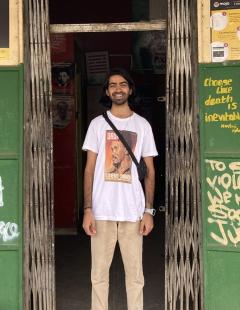Zak Essa
Tell us about your background
After an undergraduate degree in Economics and Finance from the University of Cape Town, I made my way to the rural Eastern Cape of South Africa. I worked at the Bulungula Incubator: an organisation committed to sustainably ending poverty in a generation. Living in Nqileni Village, I was surrounded by people who were committed to a better future for everyone in the region and to preserving the strong social cohesion and vibrant community life. I was surrounded by hope!

“Each of us got to lead our own research projects on topics close to our hearts. It was an experience that was equal parts exciting and daunting.”
“Each of us got to lead our own research projects on topics close to our hearts. It was an experience that was equal parts exciting and daunting.”
What made you choose to study at ODID?
In economics everything that couldn't be explained by the regression equation or measured with data gets put into an error term. I found this frustrating. I felt like what I had learned could not fully explain what I was seeing and what the people I worked with were telling me about poverty.
I chose to study at ODID to diagnose and confront injustice more effectively. I felt that the MPhil could tell me why politics matters, how history's ills linger long after liberation, and to help me build a toolkit for unravelling the complexity of the world's inequalities.
What do you particularly like about ODID?
I really liked the diversity of ODID. My favourite book growing up was The Faraway Tree. In the book, three adventurous kids discover an enormous tree in an enchanted forest. In the tree's top branches there is a ladder that takes them to magical places which change each time they visit. In some ways, studying at ODID was like visiting the faraway tree: every time I stepped foot in the department I was talking to someone from a different place, our classes took us on intellectual tours around the world and the diversity of thought meant that each interaction offered a unique perspective. Just as the children in The Faraway Tree explored different worlds, at ODID, I was exploring different cultures, ideologies, and perspectives.
What do you particularly like about your course of study?
I'm at risk of sounding like a broken record, but I can't help emphasising how wonderful the people in my cohort are. Getting to study together with them has been one of the great privileges of my life.
Another highlight was the fieldwork we all got to undertake in the summer between our first and second year. I got a chance to go to Kenya; but we were spread like jam across the globe: from Ecuador to India; Ghana to Chile. Each of us got to lead our own research projects on topics close to our hearts. It was an experience that was equal parts exciting and daunting.
What other activities have you been involved with at Oxford?
I've been involved with the mountaineering club which is an exhilarating – and cheap – way to explore the UK and to regularly get outside. I took French classes at the Language School and took part in the Oxford Character Project's Global Leadership Initiative.
Is life at Oxford different from how you expected it to be?
My imagination when I first Googled Oxford and the experience of living here were similar: picturesque, quaint, and small enough to skate anywhere. Reality exceeded my expectations when it came to the wonderful people I met and friends I made. Every person nourished my life: some showed me the value of true friendship; others exemplified hope and courage; and – every once in a while – someone tapped me on the shoulder to remind me about the responsibilities that come with the immense privilege of studying here.
What advice would you give to someone thinking of applying?
I would have never applied to Oxford in my wildest dreams. How I ended up here was happenstance. Two of my wonderful friends, Katie and Sammi, believed in me and pushed me to apply; while two of my inspiring mentors, Justine and Murray, showed me that I would not be completely out of my depth and an imposter. From my experience, the only advice I can share is this: believe that you can get in, especially if you do not fit the Oxford mold.
